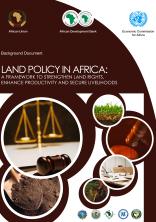Land Policy in Africa: A Framework to Strengthen Land Rights, Enhance Productivity and Secure Livelihoods

The African Union’s (AU) perspective is that agriculture and land are central in the social and economic development of the continent and that rights to land are fundamental to the participation of all people including women and disadvantaged sections of society in the development process. Africa’s development remains dependent on agriculture and exploitation of natural resources, yet agriculture and livestock production are largely carried out by smallholder farmers under increasing pressure of scarce land resources managed under unsecured customary land ownership. African governments are seeking to address tenure insecurities to promote sustainable rural and urban development, and to address inequalities in land ownership between different social groups.
The various programmes within NEPAD, the New Partnership for Africa’s Development, (including CAADP, the Comprehensive Africa Agricultural Development Programme) as well as national development plans, strategies and programmes of many African countries, all point to the importance of achieving a structural transformation as a means of attaining meaningful economic development that provides employment and hence reduces poverty. The African Union Commission (AUC), Economic Commission for Africa (ECA) and African Development Bank (AfDB) have pledged to work together in support of Africa’s economic and social development, which includes assisting African governments in their quest to achieve a structural economic transformation that not only provides employment and reduces poverty, but also ensures good governance of natural resources to ensure peace and security, and overall sustainability over time. Sound land policies which guarantee secure land access and clear property rights are a critical ingredient in achieving sustainable structural transformation which in most cases must begin with progress in developing the agricultural sector.
The AUC and African Heads of State are committed to providing a conducive environment for economic growth, poverty reduction and equitable, sustainable development. In this context, the quality of governance of land and natural resources is an important factor, and accordingly, better performance of land policies and institutions is required to deliver development goals. Land reforms must equitably address the needs of all land users, including smallholder farmers, the private sector, women, the urban poor and slum dwellers, in a context in which, increasingly, land is no longer readily available, and there are rising pressures and tensions stemming from competition for this valuable resource. In fostering social stability and good governance, land policies need to give recognition to customary patterns of land holding, and provide fair compensation in cases of expropriation of land for public good, while also responding to economic opportunity. Equitable and transparent land distribution is also a prerequisite for social and political stability at community and national levels in every country.
African governments are increasingly aware that they must take the lead in land policy and reform, since political interests are at stake. A diverse array of approaches to strengthening land rights is now emerging, and there are valuable lessons to be shared between governments, civil society groups and land professionals.
This issues paper was prepared for the High-Level Consultative Workshop convened by the AUC, ECA and AfDB, under the leadership of the AUC, in order to begin the process of developing a land policy and land reform framework for African nations. The paper is intended to provide the basis for the development of a platform document to be prepared by the workshop’s organizing partners. With this in mind, it provides an analysis of the key issues, challenges and lessons learned at different levels and based upon the outcomes of recent forums on African land issues, so as to assist the workshop in the articulation of a shared vision and rationale for the development of an Africa-wide policy framework and related guidelines.